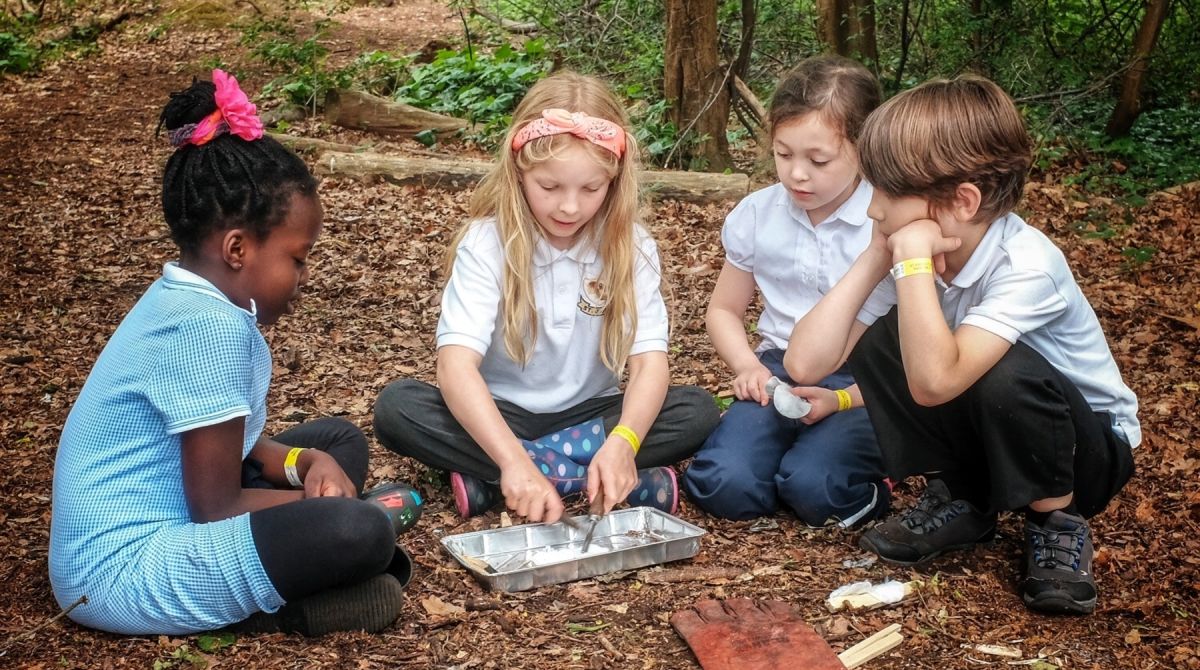Play while you learn: Kingston University students get first-hand experience of forest schooling at woodland site at Kingston Hill campus
Posted Tuesday 11 July 2023

Kingston University's PGCE primary, early years and working with children and young people: social pedagogy and social work courses have been giving students a chance to explore the increasingly popular practice of forest schooling.
As part of their curriculum, the students have an opportunity to combine theory taught in class with the invaluable real-life experience on the site developed on the picturesque woodland grounds of the University's Kingston Hill campus, where they have the opportunity to work with local pupils from schools the University have a partnership with.
 Claire Jackson, Senior Lecturer in Education Claire Jackson, Senior Lecturer in Education Claire Jackson, Senior Lecturer in Education "One of inherent strengths of forest schooling lies in its ability to positively impact the mental health and wellbeing of not only young children but also students and adults," says Claire Jackson, PGCE primary course lead at Kingston University.
Claire Jackson, Senior Lecturer in Education Claire Jackson, Senior Lecturer in Education Claire Jackson, Senior Lecturer in Education "One of inherent strengths of forest schooling lies in its ability to positively impact the mental health and wellbeing of not only young children but also students and adults," says Claire Jackson, PGCE primary course lead at Kingston University.
Forest schooling is the new approach to teaching, which promotes outdoor and child-led learning. It first originated in Scandinavia but is rapidly gaining popularity in the UK with over 10,000 schools operating across the country. The combination of the forest school approach and the standard curriculum is found to have a positive effect on children's social, cognitive, emotional, and physical skill development.
During their course, teacher training students begin with traditional in-class training, learning about the background and main philosophy of a forest school, before going outside into nature to get first-hand experience. Through group and individual exercises, the students step into the role of children, actively participating in creative activities, engaging their senses, and embracing the freedom of not working towards the completion of a particular task – a characteristic intrinsic to traditional classroom-based learning activities.
The freedom to explore and engage with nature and the lack of any pressure of the classroom is at the heart of the forest school philosophy. "Loads of communication takes place very naturally where children are automatically talking, sharing, and learning how to show empathy for others and just be kind to nature," points out Ms. Jackson. "By engaging in forest schooling exercises students develop empathy, creativity, team building, and communication, which they then apply in their future work."
 Joanna Conibear is a student of PGCE course at Kingston University and at her current placement she is involved in forest school sessions Joanna Conibear is a student of PGCE course at Kingston University and at her current placement she is involved in forest school sessions Forest schooling is the new approach to teaching, which promotes outdoor and child-led learning. When Joanna Conibear joined the PGCE course at Kingston University, she did not know enough about forest schooling. However, her love for outdoor activities and genuine curiosity about children's learning through play ignited a deep interest in delving further into this innovative pedagogical approach. She is currently doing a placement at one of the University's partnership Nursery Schools which runs forest school sessions and where she gets to take children to nature reserves and explore plants, wildlife, weather, and the environment.
Joanna Conibear is a student of PGCE course at Kingston University and at her current placement she is involved in forest school sessions Joanna Conibear is a student of PGCE course at Kingston University and at her current placement she is involved in forest school sessions Forest schooling is the new approach to teaching, which promotes outdoor and child-led learning. When Joanna Conibear joined the PGCE course at Kingston University, she did not know enough about forest schooling. However, her love for outdoor activities and genuine curiosity about children's learning through play ignited a deep interest in delving further into this innovative pedagogical approach. She is currently doing a placement at one of the University's partnership Nursery Schools which runs forest school sessions and where she gets to take children to nature reserves and explore plants, wildlife, weather, and the environment.
"As a practitioner engaging with children during the forest school session you constantly learn something new," said Joanna. "A child might tell you something you never knew about the environment, which is always very exciting."
Looking ahead, Kingston University remains committed to advancing forest schooling principles and re-establishing partnerships with local primary schools, which were disrupted due to the Covid-19 pandemic. The University hopes to resume welcoming the pupils to explore the forest schooling facilities at Kingston Hill campus at the same time giving the teaching students a chance to practice their skills in real-life scenarios.
- Find out more about teacher training at Kingston University.
- Find out more about studying working with children and young people: social pedagogy at Kingston University.
Contact us
General enquiries:
Journalists only:
- Communications team
Tel: +44 (0)20 8417 3034
Email us



